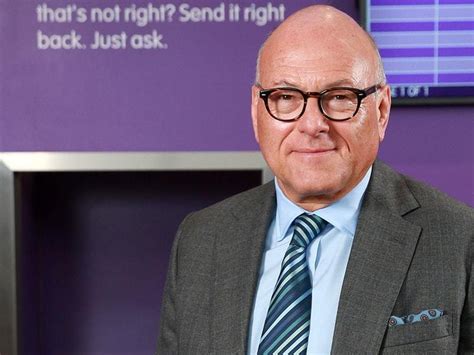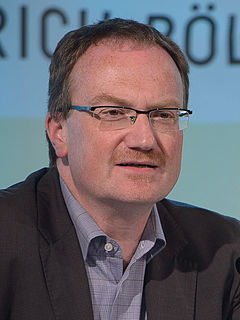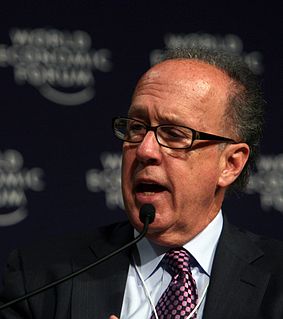Top 1200 Central Banks Quotes & Sayings
Explore popular Central Banks quotes.
Last updated on November 23, 2024.
In the old days we were the challenger brand competing against the big banks, but today I go round the world and I sit with governors of central banks and finance ministers and, in some cases, prime ministers. They all know Travelex. We are regarded as the establishment - the world's largest retailer of foreign currency.
The Central Bank should have a permanent window for discounting high quality securities where banks could go and discount these. It gives peace of mind to the banks. In the absence of this facility, what banks tend to do is to keep a liquidity cushion for emergency requirements. This is a very expensive way of managing liquidity.
The States is run by the Federal Reserve, an institution that answers only to itself and to a few large banks. It's modelled on the Bank of England. Ben Franklin said that one of the main reasons America revolted was to get away from the Bank of England, the mother of all central banks - the most pernicious and insidious of all.
Both in the US and throughout the world, there needs to be a growing presence of public development banks. These banks would make loans based on social welfare criteria - including advancing a full-employment, climate-stabilization agenda - as opposed to scouring the globe for the largest profit opportunities regardless of social costs.... Public development banks have always played a central role in supporting the successful economic development paths in the East Asian economies.
Financial institutions have been merging into a smaller number of very large banks. Almost all banks are interrelated. So the financial ecology is swelling into gigantic, incestuous, bureaucratic banks-when one fails, they all fall. We have moved from a diversified ecology of small banks, with varied lending policies, to a more homogeneous framework of firms that all resemble one another. True, we now have fewer failures, but when they occur... I shiver at the thought.
The first task of the Federal Reserve system would be to finance the World War. The European nations were already bankrupt, because they had maintained large standing armies for almost fifty years, a situation created by their own central banks, and therefore they could not finance a war. A central bank always imposes a tremendous burden on the nation for "rearmament" and "defense", in order to create inextinguishable debt, simultaneously creating a military dictatorship and enslaving the people to pay the "interest" on the debt which the bankers have artificially created.
What central banks can control is a base and one way they can control the base is via manipulating a particular interest rate, such as a Federal Funds rate, the overnight rate at which banks lend to one another. But they use that control to control what happens to the quantity of money. There is no disagreement.
The expansionary operations of the Second Bank of the United States, coupled with its laxity toward insisting on specie payment by the state banks, impelled a further inflationary expansion of state banks on top of the spectacular enlargement of the central bank. Thus, the number of incorporated state banks rose from 232 in 1816 to 338 in 1818.
When you own gold you're fighting every central bank in the world. That's because gold is a currency that competes with government currencies and has a powerful influence on interest rates and the price of government bonds. And that's why central banks long have tried to suppress the price of gold. Gold is the ticket out of the central banking system, the escape from coercive central bank and government power.
It is a sobering fact that the prominence of central banks in this century has coincided with a general tendency towards more inflation, not less. [I]f the overriding objective is price stability, we did better with the nineteenth-century gold standard and passive central banks, with currency boards, or even with 'free banking.' The truly unique power of a central bank, after all, is the power to create money, and ultimately the power to create is the power to destroy.
In 1977, when I started my first job at the Federal Reserve Board as a staff economist in the Division of International Finance, it was an article of faith in central banking that secrecy about monetary policy decisions was the best policy: Central banks, as a rule, did not discuss these decisions, let alone their future policy intentions.
There's only one thing that all of the central banks control and that is the base, their own liability, and they can control that in various ways. They can control it directly by open market operations, buying and selling government securities or other assets, for example, buying and selling gold, or they can control it indirectly by altering the rate at which banks lend to one another.
Global central banks are working hard to lift their economies through an aggressively easy monetary policy. The ECB [European Central Bank] and BOJ [Bank of Japan] are buying tens of billions of bonds and other financial securities each month in an effort to stimulate their economies, which is pushing down rates everywhere, including in the U.S.
My monetary studies have led me to the conclusion that central banks could profitably be replaced by computers geared to provide a steady rate of growth in the quantity of money. Fortunately for me personally, and for a select group of fellow economists, that conclusion has had no practical impact… else there would have been no Central Bank of Sweden to have established the award [Nobel Prize] I am honoured to receive.
This is the first global crisis that doesn't start in poor countries and it was caused by the rich countries. So it's necessary to take advantage of this crisis - the financial system has to be regulated. It's necessary that the central banks in the world should control a little bit the banks' financing, because they cannot bypass a certain range of leverage. And I believe that there's no other - more any reason for a G-8 group or any other "G." I believe that we should guarantee that the G-20 should be now an important forum to discuss the major economic issues of the world.
Yes, when they're buying there are more buyers in the market and that's supportive of the price. The more buyers you have, the firmer the price is going to be. When central banks were selling it was a headwind the market had to overcome. Now it's a tailwind that central banks are joining the buyers.
Central banks have gotten out of the central banking business and into the central planning business, meaning that they are devoted to raising up-if they can-economic growth and employment through the dubious means of suppressing interest rates and printing money. The nice thing about gold is that you can't print it.
The goal of the FED, as with all central banks, is three-fold: (1) to protect the largest commercial banks from their depositors, who occasionally exercise their contractual right to withdraw currency (the ungrateful cads); (2) to control entry of newcomers into the bankers' cartel (interlopers); (3) to keep the stock market from collapsing in a panic, thereby persuading depositors to withdraw currency
This is the joint responsibility of everyone who was involved in the introduction of the euro without understanding the consequences. When the euro was introduced, the regulators allowed banks to buy unlimited amounts of government bonds without setting aside any equity capital. And the European Central Bank discounted all government bonds on equal terms. So commercial banks found it advantageous to accumulate the bonds of the weaker countries to earn a few extra basis points.
Central banks are choosing to increase their gold holdings as a percentage of total reserves. They obviously think there is a reason to do that. It doesn't make sense to back up one currency with a hoard of other paper currencies. There needs to be a real anchor there. I think that central banks are well behind the curve. If you look at the percentage of above-ground gold controlled by central banks, it's historically low. Hence the fact that central banks are trying to increase their holdings. They've got a long way to go to get where they need to be.
So: if the chronic inflation undergone by Americans, and in almost every other country, is caused by the continuing creation of new money, and if in each country its governmental "Central Bank" (in the United States, the Federal Reserve) is the sole monopoly source and creator of all money, who then is responsible for the blight of inflation? Who except the very institution that is solely empowered to create money, that is, the Fed (and the Bank of England, and the Bank of Italy, and other central banks) itself?















































